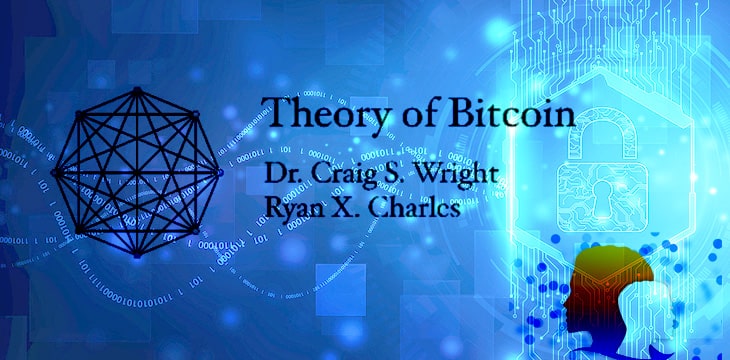|
Getting your Trinity Audio player ready...
|
The excellent “Theory of Bitcoin” discussion series continues this week with a broad range of topics. As usual, Bitcoin creator Dr. Craig S. Wright and Money Button’s Ryan X. Charles deviate from the list several times. But if you’ve been watching the series so far, you’ll also know those are often the best parts.
The series manages to teach us much about Bitcoin—often without actually talking about Bitcoin. It’s the story behind the technology, the history and philosophy, the political beliefs and economic ideology, and most importantly the passion for learning that formed the basis of its creation.
Episode 7 manages to explain a lot about Bitcoin too, and at one point Charles confesses he’s changed his definition of what Bitcoin is. That’s despite being someone who’s been studying Bitcoin technology for longer than most. It’s that feeling of a fresh start and fresh approach that many in the BSV industry have felt over the past couple of years, as the original Bitcoin protocol was restored and many began to realize what it’s really capable of.
How Bitcoin stays secure
It starts with a lesson on what keeps Bitcoin secure. The common explanation for this has been “Bitcoin is secured by cryptography”—often by people who don’t really understand what this means. Bitcoin is indexed by cryptographic methods, but its security comes from the fact it’s published, and widespread (the true power of “distributed”).
Dr. Wright doesn’t agree that quantum computers can crack Bitcoin private keys, even if they were possible (but no implementation is perfect… people are always the weakest link in any technological system anyway).
Specifically, Charles asks how it’s possible to recover stolen Bitcoins and by what means this could happen. Dr. Wright has been vocal in his assertion that Bitcoin is property and ownership is determined by law, but few realize the processes (legal and technical) recovering it would follow.
Proving you owned the Bitcoin is an important aspect of this, which is why provable identity networks and wallets that tie Bitcoin to real-life individuals are also vital. It’ll all be law soon anyway, Wright points out, since Europe’s Fifth Anti Money Laundering Directive (AMLD5) has already been signed into law and will take effect from the start of 2021.
AMLD5 has big ramifications for exchanges and wallet providers, but it will also help users recover stolen Bitcoin. There are certain essential things to remember, though: firstly, there are costs associated with recovering stolen property, and secondly, you must have taken reasonable steps to protect your private keys. For example, if you’ve shared your digital signature/private keys with other individuals at some stage, they would be considered compromised and ownership can’t be proven. The same has happened to centralized digital certificate authorities like the Netherlands’ Diginotar in 2011 — one breach compromised everything they’d ever signed.
Personal responsibility, religion, and Bitcoin’s Game Theory
You’ll have to watch all the way to the end to hear about Game Theory, but don’t worry, it’s all in there. Apparently thousands of viewers watch the “Theory of Bitcoin” videos but only about 250 watch all the way to the end. Doing so puts you in a select group of people who really want to understand Bitcoin… and you’ll need to.
The discussion then segues into how the media spreads misinformation, and Orwellian redefinition of words to re-contextualize them—something pertinent to current events in the United States and around the world. Lenin, who “in another era would’ve been a sleazy used-car salesmen in a lounge suit,” was a master at this art and used it to seek only power, not implement any ideology. The segue then moves off to other tangents where Wright and Charles discuss everything from shipping piracy to objective truth, the “post-truth world,” and free will. Dr. Wright has some pretty strong and passionate views on all these topics and both men engage in self-described rants at times—and all of them actually help understand Bitcoin’s structure.
However, the most entertaining part of this episode happens when Dr. Wright asks Charles if he knows how many people worldwide are being held hostage by pirates. The way Charles answers the question sets him apart from any other interviewer we’ve seen so far.
The most fascinating aspect of this series is this lesson: understanding many topics, that may initially seem irrelevant to what you’re doing, can still lead you to the answers you seek. That Dr. Wright’s breadth of study eventually culminated in Bitcoin is itself worth analyzing—watching the “Theory of Bitcoin” series is a great starter.
To watch previous episodes of the Theory of Bitcoin, check the Theory of Bitcoin YouTube playlist here.

 02-27-2026
02-27-2026 




